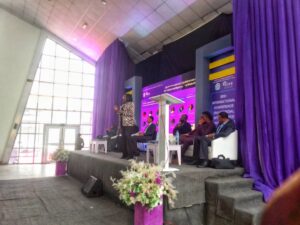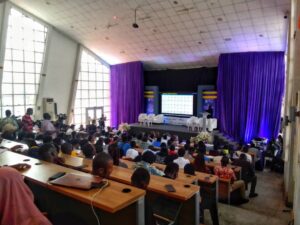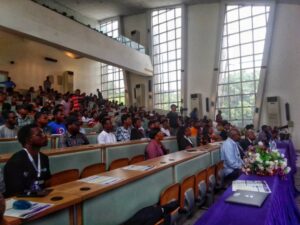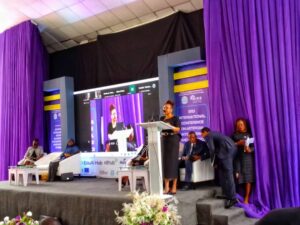EXCLUSIVE: How Artificial Intelligence and Blockchain can help develop, sustain MSMEs in Nigeria
Some university dons and Information Technology (IT) experts have advocated the full adoption of Artificial Intelligence and Blockchain as a major criteria for developing and sustaining the the nation’s Micro, Small and Medium Enterprises (MSMEs).
According to them, in a world marked by rapid technological advancements, the intersection of Artificial Intelligence and Blockchain presents unprecedented opportunities for the empowerment and development of MSMEs.
The dons and IT experts revealed this at the 3rd International Conference on Artificial Intelligence and Robotics (ICAIR 2023) with the theme “Artificial Intelligence and Blockchain for Sustainable Development of MSMEs”. The Conference was hosted and organized by the Machine Intelligence Research Group (MIRG) of the Department of Computer Science, University of Lagos (UNILAG) and NITHUB.
Declaring the Conference open, Vice-Chancellor, University of Lagos, Prof. Folasade Ogunsola said the Conference came at a time the country was in dire need of technological advancements in all its sectors.

‘Academic conferences have been one of the avenues for intellectual discourse, presentation of novel research results, introduction of new research areas, emergence of new research topics, discovery of prospective research collaborators, training of junior researchers and research students, bonding of a community of practice and co-creation of new knowledge through constructive criticism. Today, as a new and much needed trend, academic conferences have become an avenue to bring together researchers, the industry and the government for creating sustainable synergy for knowledge dissemination and uptake as well as providing evidence based data and information to guide policy formulation and review.
‘Our distinguished keynote speakers, panelists, and presenters have curated an agenda that promises deep insights into the practical applications, emerging trends, and the future trajectory of AI and blockchain for MSMEs. I encourage each of you to actively participate, engage in fruitful discussions, and leverage this opportunity to build meaningful connections with your peers,’ she said.
In his keynote speech, the Director General/Chief Executive Officer of National Information Technology Development Agency (NITDA), Mr. Kashifu Inuwa Abdulahi, ably represented by Dr. Engr. (Mrs.) Falilat Olaitan Jimoh, Head, Innovation and Digital Inclusion of NITDA said Artificial Intelligence and Blockchain are architects of a new reality, reshaping industries, driving efficiency, and unlocking innovations once deemed impossible.
‘In the vast landscape of technology, we find ourselves at the dawn of a new era — an era sculpted by the remarkable forces of Artificial Intelligence (AI) and Blockchain. These technologies aren’t mere buzzwords; they are
architects of a new reality, reshaping industries, driving efficiency, and unlocking innovations once deemed impossible. As we gather here today, the possibilities are boundless, and the impact, both globally and in developing
economies like Nigeria, is nothing short of extraordinary.

‘I stand before you today with an unwavering sense of purpose and excitement as we delve into the transformative realms of AI and Blockchain for the sustainable development of Micro, Small, and Medium Enterprises (MSMEs).
This conference not only marks a critical juncture in our collective exploration of these technologies but signifies a national movement to to propel the digital transformation ignited by our administration.
‘In the dynamic landscape of technology, where the ICT sector contributes significantly to our GDP, we find ourselves at the forefront of change. Nigerians aptly refer to the ICT sector as the “new oil” — a testament to its potential for economic growth and diversification.’
The NITDA boss explained that the adoption of AI and blockchain could help improve the nation’s revenue drive. He also highlighted how the agency is financially supporting researchers and start-ups to accelerate the adoption of AI and blockchain technologies.

‘As we embrace the digital future, AI is proving to be a formidable force, with projections indicating a substantial global revenue of $134.8 billion by 2025. The McKinsey Global Survey 2023 underscores the resilience of AI adoption, even in challenging economic climates. For Africa, AI holds the promise of contributing a staggering $1.5 trillion to the economy by 2030, as projected by Price Waterhouse Coopers (PwC).
‘NITDA, recognizing the need for sustained investment in emerging technologies, has taken bold steps. The establishment of the National Centre for Artificial Intelligence and Robotics (NCAIR), a subsidiary of NITDA, stands
as a testament to our commitment. NCAIR, focusing on AI, Robotics, Drones, and Blockchain; is driving transformative initiatives aligned with our digital economy’s strategic plan.
‘In tandem, NITDA’s National Blockchain Adoption Strategy and the approved National Blockchain Policy for Nigeria outline our roadmap for integrating Blockchain technology into our digital transformation agenda. We acknowledge Blockchain’s potential to revolutionize industries from finance to healthcare, governance, and supply chain management.

‘The synergy between AI and Blockchain forms the cornerstone of our digital evolution. Initiatives like the Nigeria Artificial Intelligence Research Scheme (NAIRS) exemplify our commitment to fostering a vibrant AI ecosystem. With financial support for researchers and start-ups, we aim to accelerate AI research, laying the groundwork for inclusive economic growth and societal advancement.’ Abdullahi explained.
Bottlenecks to adoption of AI and Blockchain in Nigeria
Meanwhile, the Chairman, Local Organising Committee (LOC) of the Conference and Senior Lecturer in the Department of Computer Science, UNILAG, Dr. Victor Odumuyiwa in an exclusive interview with NewsClick Nigeria said adoption of Artificial Intelligence and Blockchain portend a great advantage for not only the MSMEs in Nigeria but the nation’s critical sectors in general.
‘We are talking about fourth Industrial Revolution. What are the drivers? We’re talking about AI. We’re talking about disruptive technologies. We’re talking about Internet of Things. We’re talking about Blockchain. They are really things that will determine the present and the future, even the prosperity of nations. AI will help us to make sense out of the data we have. We are getting to a stage where we’re having intelligent systems that can make you very productive. And the blockchain aspect is helping us to ensure more security and to be so sure that we can say that if this is the data we’re talking about, this data is correct. Nobody’s tampering with it. And if they tamper with it, we can see that it has been tampered with. We’re in a world where digitalization is happening at an increasing rate and more processes are being digitalized. The more processes are digitalized, the more the data being generated. So what AI is doing is bringing intelligence out of those data; and that’s going to help us to optimize our processes, to know what we should not be doing, to know what we are doing that we don’t even understand that this is actually happening in what we do, to see patterns and define right business models. Because even at times you are doing business but your business model is wrong. With data and AI, you may be able to know the kind of business model that will work for your business.’
On certain bottlenecks to adoption of Artificial Intelligence and Blockchain and what government can do to ease the process, Odumuyiwa said:
‘First of all, competence. You need to understand the technology. So we need to train, we need to raise people, we need to raise talents. All these technologies I’m mentioning are not something, you just wake up one morning and say you are doing. No, it takes time, you learn it. You build capacity. That’s number one.
‘Two, infrastructure. You cannot be building AI where you don’t even have serious data and network infrastructure on ground. So we need infrastructure, even common infrastructure that all these things will run on.
‘We also need some policies that can help us to protect existing businesses creating these technologies and to encourage new people to enter into this domain. So that can help people to begin to see, okay, I can go into this because this policy will support me to grow. So we need government support as well.
‘There should be incentives that can help businesses and startups to grow in the development and adoption of these technologies. You know, one thing is that if you have gone to other climes, they support innovators and startups to grow. In those climes the government are not going to be looking at what they can generate from such businesses at the initial stage. They would rather give them all the support to grow because they know that when they grow they are going to have enough taxes, money to make from them and even from people working for them. So such governments invest in businesses that makes sense to grow. As they grow, those businesses may be able to remit something back to government in form of taxes.’

